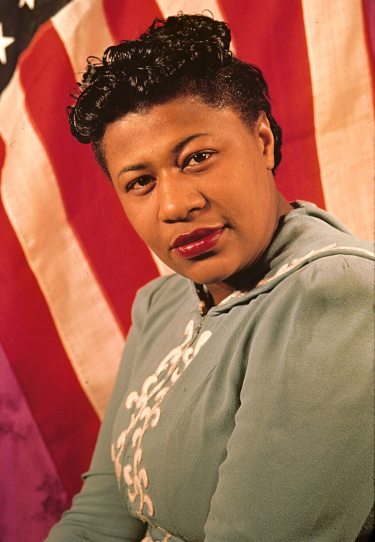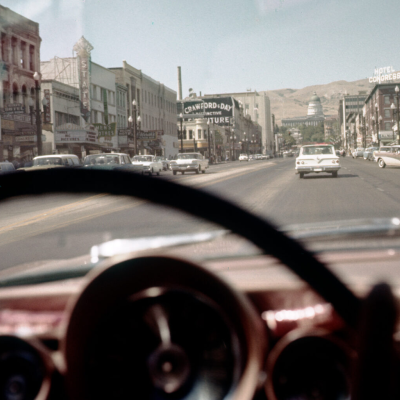.
.
We value creative writing and wish to encourage writers of short fiction
to pursue their dream of being published. Jerry Jazz Musician would like
to provide another step in the career of an aspiring writer. Three times
a year, we award a writer who submits, in our opinion, the best original,
previously unpublished work.
Rebecca Marshall-Courtois of Buxerolles, France is the sixth recipient of
the Jerry Jazz Musician New Short Fiction Award, announced and published
for the first time on July 1, 2004.
.
.
.
Rebecca Marshall-Courtois
.
*
Rebecca is a former New Yorker who has been living in France for fourteen years. Her stories have appeared in several online and print publications, and she’s currently hard at work, fine-tuning her novel. She’s also a teacher and doctorate student whose research work is based on the role of jazz in Toni Morrison’s novels.
It was through her first love, literature, that she was reintroduced to an old friend and lover, jazz. Now her CD racks are filling up about as fast as her bookshelves. Writing fiction replaces her unfulfilled desire to sing. Nothing can bring her to tears like the emotion a great voice transmits.
.
,
___________________________
.
.
.
The Place Where Colored Notes Play
By Rebecca Marshall-Courtois
.
___
.
…..Today, Celina is going to. live up to the promise she made to him fifteen years ago, that November day.in the neurologist’s parking lot, when he told her, “When my voice goes, .I go.”
…..Ray can still hear the pitter-patter of raindrops on the umbrella they’d shared that day, drumming out the minutes that passed ;as they stood, emotionally and physically immobile, terrified at the thought. of taking another step. And he can still recall the wet wool smell of her .sweater when he tucked his face into the hollow of her neck to hide his tears. .But he thought Celina had chosen to forget that day and her vow, until two
months ago when she asked him if he’d changed his mind. “Squeeze my arm if .you still want to,” she’d told him.
…..And he managed somehow to control his left hand long .enough to answer her. Since then, she’s cried every morning under the shower, and he’s pretended not to hear her.
…..When she dresses him, she fumbles with the buttons, and he .notices her nervous, shaky hands that remind him of his own, back when .he .managed to control them enough to do anything at all. He’s not contagious .though, he’s just become exactly what he never wanted to be-a burden.
…..From the bedroom, he listens to the chimes on the front door jingle as she comes and goes, loading the car for the trip. Then she. loads him into the passenger’s seat.
…..It’s a long drive to the ocean, but she doesn’t fill.it with music or the sound of her voice, and he’s grateful. She gives his. knee a squeeze at a traffic light. He watches the lines in the road come. and go underneath the car, and her hands grip the wheel. He senses her .concentration and knows that she’s not worried about taking a wrong turn .as much as she is about turning around. He wishes he could touch her thigh, .just give her a pat to encourage her. A little groan escapes his lips, and. he hopes she won’t misinterpret it. She keeps on.
…..When they turn off the parkway, she opens her window. a crack and tilts her face towards the air. Celina’s always loved the smell .of the sea, a smell that Ray has never found appealing, but of course, smells. and tastes are her forte, not his. Celina has spent their twenty-seven years .together trying to teach him how to identify all the tastes made available. to his palate, and he’s spent those years trying to show her how to see and. feel music. They complete each other, or had until he became this half .a person, this person who could still use his six senses but who could barely. react to any of them.
…..One lone jogger and his dog share the beach with them. .It’s morning and February, too early for strollers, too cold for bathers .and perfect for this. Although it’s a cliché, he couldn’t help but .ask her to take him here. As a kid, he came here to collect beach glass-softened .chunks of broken glass he found on the sand at low tide and pretended were. gemstones. In a way, that’s what they were, treasures, and it still fascinated. him what the ocean could do to broken bits of bottles. She sucks them in,. churns them around and spits them back out in a bettered, softened form.
…..Celina helps him out of the car and into his wheelchair. She manages to tug and shove it halfway down the sand before giving up and. snapping the blanket open. When she lifts him in her arms, Ray’s chest contracts. .To think, he used to carry her like this into the bedroom.
…..The touchable sky makes him forget the chill that Celina. tries to protect him from. She spreads Ray out over her lap, and a second. blanket over him, burying him from his toes to his chin. He likes it when. she covers his body up like this-Ray doesn’t have to watch its spasmodic .dance. Her fingers and the wind comb the hair off his face. Under his legs,. he feels the Earth trembling with the ocean’s pulse. He watches the waves. glide towards them, the silver spittle explode onto the jagged rocks, and .every few minutes the wind carries the spray to his face. Celina wipes his. cheeks dry with the cuff of her sweatshirt, enveloping him in her perfume. which reminds him of baking gingerbread.
…..Although he’s anxious now, he forces himself to savor .the lingering minutes that pass, the heat of her body against his back, the .clean salty air rushing through his lungs, stinging his throat like high notes used to in smoke-filled bars. If he closes his eyes, he can still taste .the whisky on his tongue, feel the tickle of the microphone on his lips.
…..She pulls his fingers from his hair and kisses the spot .she’s abandoned before she reaches into the bag. Ray listens to the squeak. of the corkscrew, and Celina softly jabs his back with her elbow when she .yanks the cork out. It’s easier for her this way, he thinks. He can’t see.what she’s doing behind him, and she can’t watch his face. If she did, she .might lose her courage.
…..But she’s stronger than he imagined. When Celina kneels before .him, her eyes are hardly melancholy, and she lifts the first of two cups. to his lips with steady hands. She forces him to guzzle the first cup in. one go, and he soon understands why. A bitterness makes him gag, but she. massages his Adam’s apple, and the liquid slips down. Then she offers him .the second cup, only a few drops at first, a moment to dwell on the flavors .they offer which work to coat and dissipate the unpleasant taste that clings. to his tongue like talc. Then she helps him swallow the rest of the glass, .dabbing his chin dry with a wadded tissue. He expected it to taste funny, .but he didn’t expect the wine to cover it up so entirely. All he can taste .now are the complicated flavors of Burgundy that Celina has tried to coax. him into appreciating for years-the sweet dried plums, the coarse tinge of .damp forest leaves and the tang of red currants. The wine warms him from .the inside, makes his face prickle. She sets the glass down and kisses him. .He wishes he could respond to her lips, to the caress of her palm on his .cheek, and more than that, he wishes he could tell her that he finally got .it right, that he finally understood what she tastes in the wine.
…..Only then, gazing into her tranquil eyes, does he comprehend .how much he’s asked of her. Had she asked him to do the same thing, he never .could have managed it. Had he tried, he would have wept like a child, ruining .the gesture with regret.
…..When she presses the play button on the CD player at .his feet, Ray’s heart does a little two-step, out of time with the slow overture. .But smoothly, he settles into the music. Notes, melodies, rhythms-his first. loves massage him. Nothing is more erotic and stimulating. Sex comes close, .of course, but he learned what music could do to his body long before he .discovered what a woman’s touch could. When the two forces combined, he found .heaven. Today, he has to pretend.
…..He stares at Celina whose name is his favorite song. .He photographs this picture of her-her hair in the wind, a moving mane that .encircles her face like the flames of the sun. Shutting his eyes, he draws. up this image of her and continues to watch her, as he lets the music work .him over. The calls-and-responses make his body ache with desire to let his .voice take over, the only instrument he’s ever had the patience to learn .how to play. But he dances behind his closed eyelids, flying on this windy. beach with Celina in his arms, and he makes love to her, exploring her skin. with his lips, distributing kisses to the rhythm of the music.
…..He sees the music now, the colorful notes that have always guided .his voice through a song, dancing before him, pulling him to places he longs. to go. He watches the slithering call of the reds, the slow approach of greens,. the sharp sparks of blues, and the bursts of yellows, wishing again, he could .respond to them. His entire life, he’s tried to find lyrics to take him to .them, but he’s never found the right words. The closest he’s come is when .he lets his voice work like an instrument, emitting only scales. Perhaps. the words are what has stopped him all this time.
…..She’s chosen the song carefully, and although it’s not his favorite, he knows it suits the occasion like no other could. Lyrics could never have expressed what Celina and he are sharing. Lyrics would have haunted her. .But pure jazz never ends with the final note. It invites circularity, repetition, eternity.
…..He feels it coming. Celina takes his hand in hers, but her touch is distant now. The notes wrap him up, and they become tangible, scampering around his body, his insides, his mind, soothing him as they go. They’re silky and warm; they slide, twirl, jiggle and throb. Their energy keeps him holding on until the end of the song.
…..Celina sprawls out over him, blanketing him with her body. If only he could tell her how .much he loved her, but then he remembers-he doesn’t need words. She knows. When he recognizes the final stanza, he lets the music lift his soul away. Finally, they take him there, to that place where colored notes play.
.
.
___
.
.







































